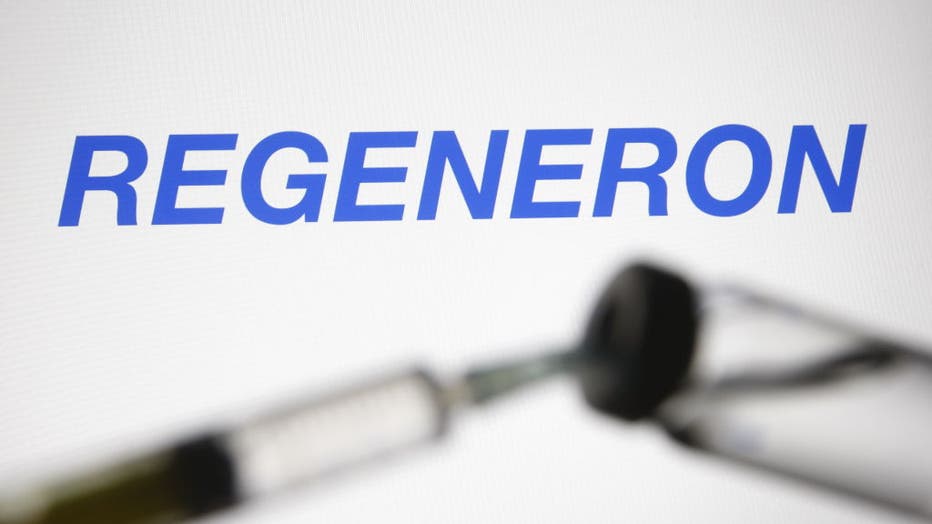Regeneron says single dose of antibody treatment cut COVID-19 risk by 81%
What to know about Pfizer's COVID-19 vaccine for kids 5 to 11
Kids between the ages of 5 and 11 are now eligible to get the Pfizer-BioNTech COVID-19 vaccine.
TARRYTOWN, N.Y. - Regeneron Pharmaceuticals said Monday that a single dose of its antibody treatment reduced the risk of contracting COVID-19 by 81.6% for up to eight months, according to its late-stage trial. The company said the results could potentially pave the way for broader use in helping to protect certain people with weakened immune systems.
The monoclonal antibody treatment, called REGEN-COV, is currently available under an emergency use authorization by the U.S. Food and Drug Administration to treat patients with mild to moderate COVID-19 and are at risk of developing severe symptoms. It has also received FDA emergency approval as a post-exposure preventive treatment for some people at high risk for developing severe COVID-19, are not fully vaccinated or are immunocompromised, and have known exposure to the virus.
The Tarrytown, New York-based biotech company announced the results of its Phase 3 clinical trial jointly run with the National Institute of Allergy and Infectious Diseases (NIAID), which assessed giving the treatment to people who lived in a household with someone diagnosed with COVID-19 within the previous four days.
It said four subcutaneous injections of the monoclonal antibody treatment protected uninfected people from contracting COVID-19 by 81.6% during the follow-up period of two to eight months, up from 81.4% after one month. Four injections of the treatment are considered one dose.
"These results demonstrate that REGEN-COV has the potential to provide long-lasting immunity from SARS-CoV-2 infection, a result particularly important to those who do not respond to COVID-19 vaccines including people who are immunocompromised," Dr. Myron Cohen, a physician who leads the monoclonal antibody efforts for the National Institutes of Health, said in a news release.
RELATED: Regeneron’s COVID-19 drug authorized by FDA for injection
Regeneron previously shared similar research in a study published Sept. 23 in the New England Journal of Medicine. The company said a new analysis of the data over a longer period showed that REGEN-COV "continued to prevent infection, without requiring additional doses."
The Phase 3, randomized, placebo-controlled trial involved 1,683 people who were not infected with SARS-CoV-2 and did not have antibodies at baseline. Among the participants, about half received a 1,200-milligram dose of the antibody treatment, and the others received a placebo.
During the eight-month assessment period, the company said no hospitalizations were reported among participants who received the treatment, while six were reported in the placebo group. No deaths were reported in either group.
The company said the trial allowed participants to get vaccinated after the first month. Approximately 34.5% of the REGEN-COV group and 35.2% of the placebo group had received at least one COVID-19 vaccine dose by the end of the 8-month assessment period.
Regeneron said the treatment could potentially benefit those with weakened immune systems and do not develop sufficient protection after full vaccination — and therefore are at higher risk of developing breakthrough infections.
"These data add to the increasing body of evidence supporting use of REGEN-COV to prevent COVID-19 in uninfected individuals, which may be especially useful for the many immunocompromised people who do not respond adequately to vaccines and remain 'prisoners of the pandemic,'" said Dr. George D. Yancopoulos, Regeneron's president and chief scientific officer. "With infections still occurring despite widespread vaccination, the immunocompromised face an ongoing risk of encountering the virus during their daily lives."

FILE - In this photo illustration, a Regeneron Pharmaceuticals logo of a US biotechnology company is seen behind a medical syringe and a vial. (Photo Illustration by Pavlo Gonchar/SOPA Images/LightRocket via Getty Images)
Antibody treatments remain one of a handful of therapies that can blunt the worst effects of COVID-19 — and they are the only option available to people with mild-to-moderate cases who aren’t yet in the hospital. They have risen in demand in U.S. states that have experienced a spike in infections, including Florida, Louisiana and Texas, where hospitalizations among the unvaccinated overwhelmed the health care system.
The main drug in use is the Regeneron antibody cocktail, which has been purchased in mass quantities by the U.S. government. It’s the same drug former President Donald Trump received when he was hospitalized with COVID-19 in October of 2020.
The drugs are laboratory-made versions of virus-blocking antibodies that help fight off infections. The treatments help the patient by supplying concentrated doses of one or two antibodies.
Other, more convenient COVID-19 treatment options have shown promising results in recent days, including an experimental antiviral pill by Pfizer for COVID-19 that was shown to cut rates of hospitalization and death by nearly 90% in high-risk adults. Competitor Merck’s COVID-19 pill is already under review at the FDA after showing strong initial results.
Experts agree that keeping people out of the hospital is a top priority, but say vaccines — not treatments for people after they get sick – are the best way to do that. Dr. Chris Beyrer, an epidemiologist at Johns Hopkins University, emphasized this point recently while noting how many in the U.S. remain hesitant to get the COVID-19 vaccine.
"Even in some very vaccine-hesitant communities, including in the U.S., people have been willing to get the monoclonal antibodies. The difference is that one is truly primary prevention and the other is secondary prevention. Primary prevention is always better," Beyrer said.
This story was reported from Cincinnati. The Associated Press contributed.

